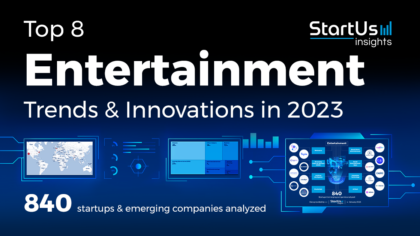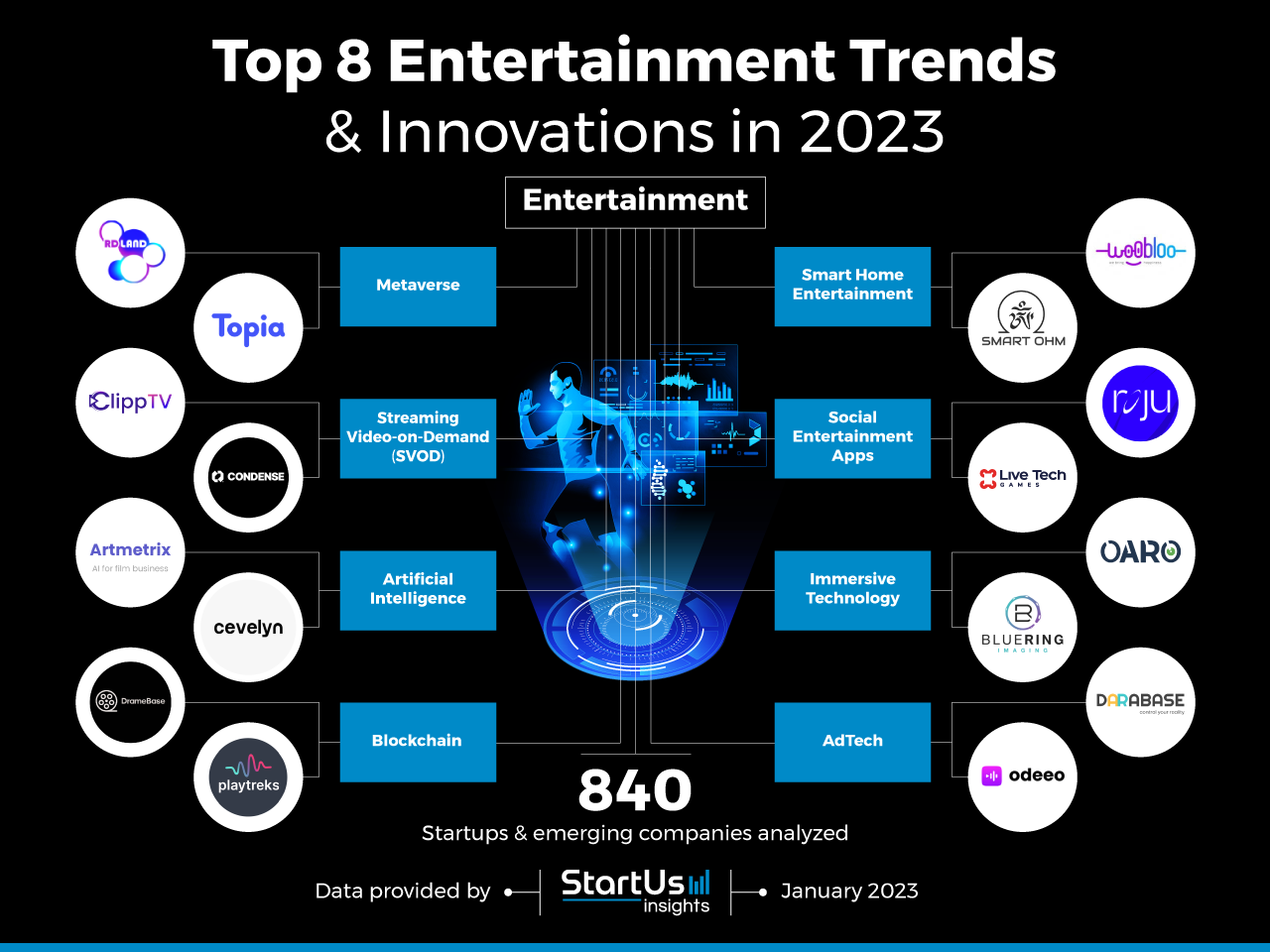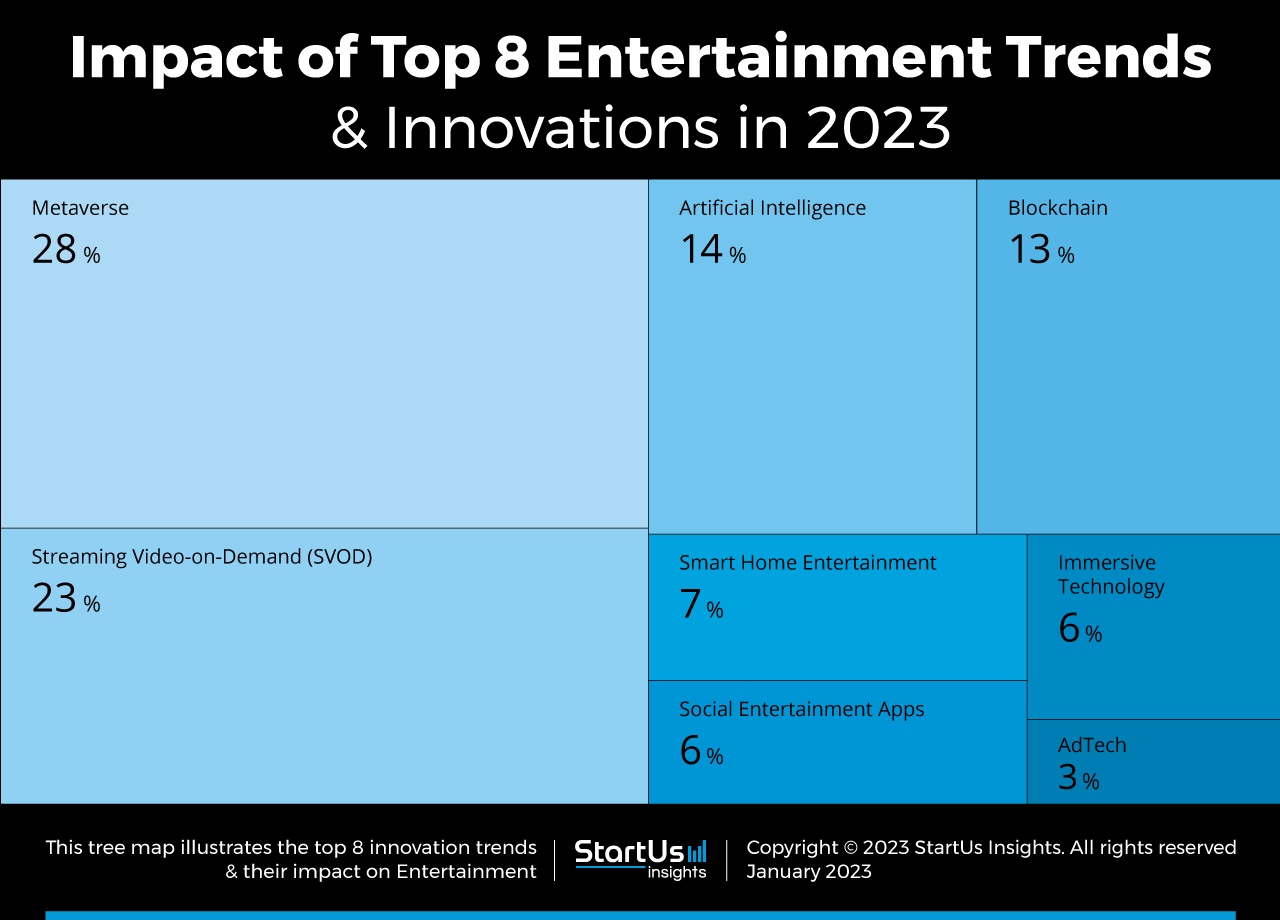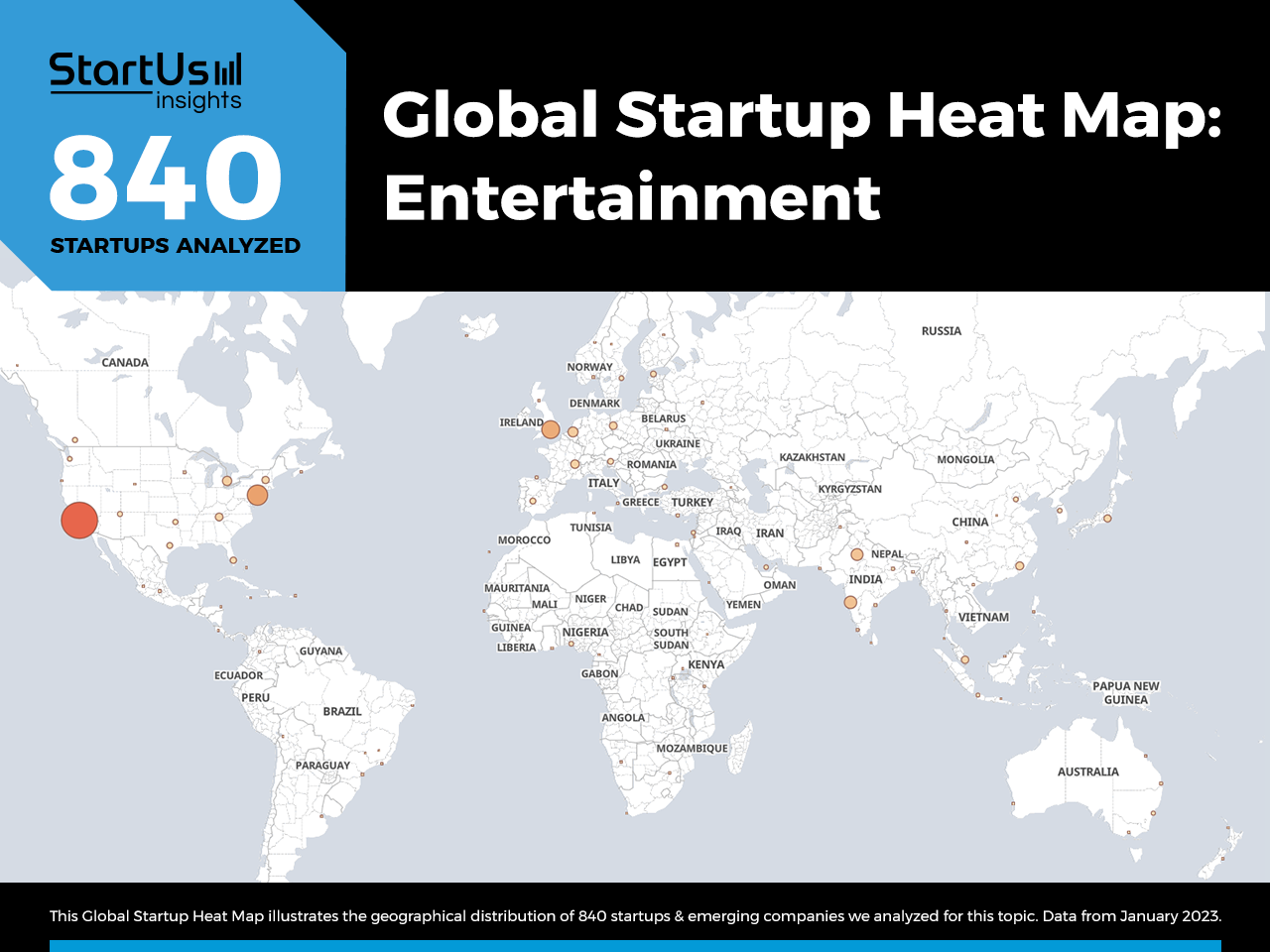Accelerate Productivity in 2025
Reignite Growth Despite the Global Slowdown
The entertainment industry is constantly evolving with digitalization being among the main drivers. Innovations in digital entertainment technologies and the transition to home entertainment are making an impact on the entertainment industry. The way people find and consume entertainment is drastically different from even a few years ago. For example, immersive technologies such as augmented reality, virtual reality, and other interactive content maximize user engagement. Read more to explore the top trends and innovations impacting the entertainment sector.
Innovation Map outlines the Top 8 Entertainment Trends & 16 Promising Startups
For this in-depth research on the Top 8 Entertainment Trends & Startups, we analyzed a sample of 840 global startups and scaleups. The result of this research is data-driven innovation intelligence that improves strategic decision-making by giving you an overview of emerging technologies & startups in the Entertainment industry. These insights are derived by working with our Big Data & Artificial Intelligence-powered StartUs Insights Discovery Platform, covering 2 500 000+ startups & scaleups globally. As the world’s largest resource for data on emerging companies, the SaaS platform enables you to identify relevant startups, emerging technologies & future industry trends quickly & exhaustively.
In the Innovation Map below, you get an overview of the Top 8 Entertainment Trends & Innovations that impact companies worldwide. Moreover, the Entertainment Innovation Map reveals 16 hand-picked startups, all working on emerging technologies that advance their field.
Tree Map reveals the Impact of the Top Entertainment Trends
The Tree Map below illustrates the impact of the Top 8 Entertainment Trends in 2023. Developments in the metaverse and immersive technology are making content to be more engaging and interactive. Advances in AI and blockchain speed up content creation and distribution while also making them more secure. In addition to this, startups are developing innovations in streaming video on demand, smart home entertainment, and social and social entertainment apps. Lastly, AdTech solutions utilize developments in immersive technologies to create highly engaging content.
Top 8 Entertainment Industry Trends
- Metaverse
- Streaming Video-on-Demand
- Artificial Intelligence
- Blockchain
- Smart Home Entertainment
- Social Entertainment Apps
- Immersive Technology
- AdTech
Global Startup Heat Map covers 840 Entertainment Startups
The Global Startup Heat Map below highlights the global distribution of the 840 exemplary startups & scaleups that we analyzed for this research. Created through the StartUs Insights Discovery Platform, the Heat Map reveals the most startup activity in the Hollywood & Eastern USA regions followed by moderate activity in the UK, India, and parts of Asia.
Below, you get to meet 16 out of these 840 promising startups & scaleups as well as the solutions they develop. These entertainment startups are hand-picked based on criteria such as founding year, location, funding raised, and more. Depending on your specific needs, your top picks might look entirely different.
Top 8 Entertainment Innovation Trends in 2023
1. Metaverse
The COVID-19 pandemic and restrictions on movement accelerated the adoption of metaverse technologies. Startups develop immersive and collaborative tools to allow companies to create shared environments. These allow users to interact using avatars regardless of their location in the world. Moreover, the applications of the metaverse go beyond entertainment to increase office productivity using gamification through avatars and collaborative virtual environments.
RD Land creates a Virtual Events Platform
British startup RD Land develops a multi-sensory virtual events platform. The platform uses extended reality (XR) to create pre-made and prefabricated worlds. It also lets users create, publish and monetize their own all-inclusive, safe, and explorative worlds. These worlds enable self-expression, arts, social interaction, or virtual relationships.
Topia develops a Social Interactivity Platform
US-based startup Topia replaces traditional social interaction and engagement with interactive experiences in the metaverse. It lets users build and explore immersive worlds using a fully customizable canvas. The startup’s solution features peer-to-peer web real-time communication with decentralized, end-to-end encrypted connections that protect privacy. Moreover, it makes daily stand-ups, happy hours, and other social meetings and gatherings more engaging and entertaining.
2. Streaming Video-on-Demand (SVOD)
The shift to work from home marked an uptick in the use of video streaming services. Additionally, streaming services provide a wide range of benefits over cable television such as personalized content, lower costs, and accessibility from any device and location. However, factors such as poor bandwidth and inconsistent video quality the growth of SVOD services. To alleviate these problems, startups are creating software and hardware infrastructure to provide consumers with seamless viewing experiences.
ClippTV develops an AI-based Streaming Platform
Singaporean startup ClippTV creates an AI-based video clipping and streaming platform for event organizers. Its platform provides organizers with a unique and shareable link for each special moment in their ClippTV event channel. Additionally, authorized guests can clip and upload their own special moments to organizer streams. In this way, the startup’s solution provides event organizers and guests with a social experience during the event streaming.
Condense specializes in Live-Streamed Volumetric Video
British startup Condense enables content creators and performers to live-stream events into 3D virtual worlds. It combines a portable multi-camera system with a cloud platform for real-time rendering and streaming with features like high-performance decoding and variable bitrates. It also renders volumetric videos on the web or on mobile devices. The platform reduces the technical complexity of streaming live events into the metaverse for businesses, venues, and performers.
3. Artificial Intelligence
The rate of content consumption has been consistently growing since the advent of online streaming. This creates new challenges such as creating high-quality content fast enough to meet consumer demand and engaging advertising. Startups are addressing these concerns by automating video and music creation by implementing AI algorithms to target audiences. AI also assists the entertainment business in detecting and identifying fake and copied content to protect their brands.
Artmetrix provides AI-based Script Analysis
Indian startup Artmetrix develops an AI-based filmmaking platform that features intelligent script analysis. Trained on over 10 000 film databases, it evaluates scripts on key storytelling parameters. It also compares actors using proprietary metrics as well as enables filmmakers to understand their film’s position relative to historical databases. This results in faster and better script selection as well as improves the economics of promotional activities.
Clipcil offers an AI Music Composer
Clipcil is a Turkey-based startup that offers Cevelyn, an AI music composer. It features emotional awareness to produce personalized music. Cevelyn finds use in a wide range of application areas including composing music for malls, movies, commercials, games, and TV shows. It speeds up music creation while making synthetic music sound more natural and personal.
4. Blockchain
The entertainment industry is increasingly adopting digitalization through technologies such as streaming, peer-to-peer sharing, and immersive technologies. However, this exposes the industry to vulnerabilities associated with digital sales and transactions. Startups are leveraging blockchain to secure intellectual property in the digital economy. Blockchain’s open and decentralized nature enables developers to monetize assets through smart contracts and secure digital transactions. Entertainment companies are also leveraging to offer unique fan experiences such as with digital collectibles.
Dramebase develops a Decentralized Media Streaming Platform
Nigerian startup Dramebase develops a blockchain-based decentralized media streaming platform. Its platform uses Blockchain InterPlanetary File Systems (IPFS) to provide transparency, security, and control to royalty payments as well as prevent copyright infringements. Besides this, its music smart contracts execute transactions immediately to credit artists and let artists mint their content as non-fungible tokens (NFTs). Moreover, the platform tackles problems such as underpayment of royalty to music artists, lack of clarity in revenue generation, and copyright infringement.
PlayTreks provides a Blockchain-based Music Marketplace
Belgian startup PlayTreks develops a blockchain-based music distribution marketplace. It allows artists to secure songs and digital proof of ownership of their creations. Besides digital rights, it features unlimited music data, free music distribution, airplay monitoring, and NFTs. This way, PlayTrek’s solution increases transparency in music content ownership and distribution. Moreover, when a creator uploads music from PlayTreks to any major traditional streaming platform, it automatically gets added to the blockchain marketplace.
5. Smart Home Entertainment
Home automation systems are a fast-growing technology trend in the entertainment industry. The foundation of connected homes lies in the use of smart sensors that were previously only associated with industrial applications or were uneconomical. However, with advances in IoT technology, smart sensors are finding use in home systems, mainly for entertainment. Moreover, as sensors become smaller and more capable, startups are integrating them into devices to provide them with additional intelligent functions.
WooBloo manufactures a Smart Projector
US-based startup WooBloo manufactures SMASH, a smart projector that also serves as a multifunctional entertainment device. It uses digital light processing (DLP) technology to project up to a 120” display. It also features an AI-driven voice assistant, far-field voice recognition, and wireless screen sharing. Moreover, the device is portable and enables users to stream content from their laptops or smartphones which the device projects. This increases the value customers gain from their smart home devices.
Smart Ohm provides Smart Home Automation
Indian startup Smart Ohm creates smart home automation technologies. Its smart home entertainment solution controls lighting, TV, audio, and curtains in living rooms with sensors for presence detection. Additionally, it connects multiple rooms with audio controls. These solutions optimize and uplift the home entertainment experience.
6. Social Entertainment Apps
The global mobile app market is growing exponentially with applications for gaming, health, fitness, music, finance, social networking, and retail. Social entertainment apps are impacting how people discover and consume entertainment on their apps. These apps allow brands to engage targeted audiences, leading to greater retention. Startups are developing social entertainment apps that combine social interaction with entertainment and lifestyle activities.
ROJU develops an eSports Fitness App
Hong Kong-based startup ROJU creates an eSports fitness app that combines eSports, entertainment, and online training. The app lets users track their progress and calories burnt and provides global athletes and coaches as mentors. It gamifies fitness by offering medals and ROJU coins for performing rope skills, workouts, and challenges. ROJU also promotes eSports and engagement with competitions for users.
Live Tech Games creates Live Mobile Tournaments
UK-based startup Live Tech Games offers live mobile games during tournament broadcasts. Its mobile games complement the events by connecting players from across a region. Its live mass-participation technology enables broadcasters and advertisers to create additional fan engagement. This, in turn, increases customer conversion and retention.
7. Immersive Technology
Digitalization, miniaturization of devices, and increase in computing power are also lowering the barrier of entry to immersive technology, promoting its use for both commercial and personal purposes. Entertainment companies are leveraging immersive technologies such as augmented and virtual reality (AR/VR) to create engaging content and experiences for users. Smart devices also offer new opportunities to implement immersive experiences. Other hardware solutions make immersive solutions more portable and easier to implement.
oARo Studio develops Object Tracking Cameras
French startup oARo Studio develops EZtrack, a modular object-tracking camera solution for virtual production. It is a compact system that provides accurate tracking and is compatible with any camera type as well as multi-camera setups. EZtrack reads zoom and focus data from a wide range of digitally encoded lenses as well as prime lenses. It makes it easier for studios to track and record people or objects when creating 3D media.
Blue Ring Imaging creates Mixed Reality Interfaces
US-based startup Blue Ring Imaging provides mixed reality hardware and software tools to teleoperate underwater vehicles. Its system features a multi-lens camera that provides 360 3D streaming with software that performs sensor fusion for AR and VR functionality. Besides this, it contains intelligent multimodal interaction software for voice, gesture, and eye tracking. The startup’s solution collect 3D data for movie productions as well as entertainment broadcasts.
8. AdTech
Advertising companies are adopting advancements in technologies such as AR and VR to create more entertaining ads. This is further amplified by the upward trend in e-commerce. Moreover, the shrinking patience of consumers means that unlike before typical video ads do not attract attention. This is why startups are creating interactive ads that allow users to interact with them via video or with AR or VR. These technologies not only reduce the possibility of viewers skipping ads but also direct improve revenue generation.
Darabase creates Outdoor AR-based Ads
US-based startup Darabase creates location-based outdoor AR-based ads. Its AR ad formats are quick, simple, and cost-effective and use existing digital assets with templates for immersive experiences. The ads augment new and existing outdoor media. In addition to proving interactivity through mobile devices, it integrates wayfinding and map-based functions to direct viewers to nearby stores. This improves sales conversion through the gamification of ads.
Odeeo offers In-Game Audio Advertising
Israeli startup Odeoo develops an ad platform for non-intrusive in-game audio advertising and experiences. Game studios only need to provide a script while the platform handles the recording, sound, mixing, and producing. It also analyzes the average revenue per daily active user (ARPDAU). It provides game developers with a transparent way to monetize and measure user engagement, enabling them to create more engaging games.
Discover all Entertainment Trends, Technologies & Startups
The increasing adoption of the metaverse and immersive technologies is reinventing the entertainment industry. With changing preferences, consumers now spend more on entertainment such as streaming services, esports, and mobile gaming. In the years to come, entertainment technologies will continue to make these services more interactive and engaging.
The Entertainment Trends & Startups outlined in this report only scratch the surface of trends that we identified during our data-driven innovation and startup scouting process. Among others, experiential audio, immersive gaming, and metaverse will transform the sector as we know it today. Identifying new opportunities and emerging technologies to implement into your business goes a long way in gaining a competitive advantage. Get in touch to easily and exhaustively scout startups, technologies & trends that matter to you!

 WATCH THE VIDEO VERSION
WATCH THE VIDEO VERSION 



![Explore the 10 Emerging Smart City Trends [2025-2026]](https://www.startus-insights.com/wp-content/uploads/2025/06/Smart-City-Trends-SharedImg-StartUs-Insights-noresize-420x236.webp)




